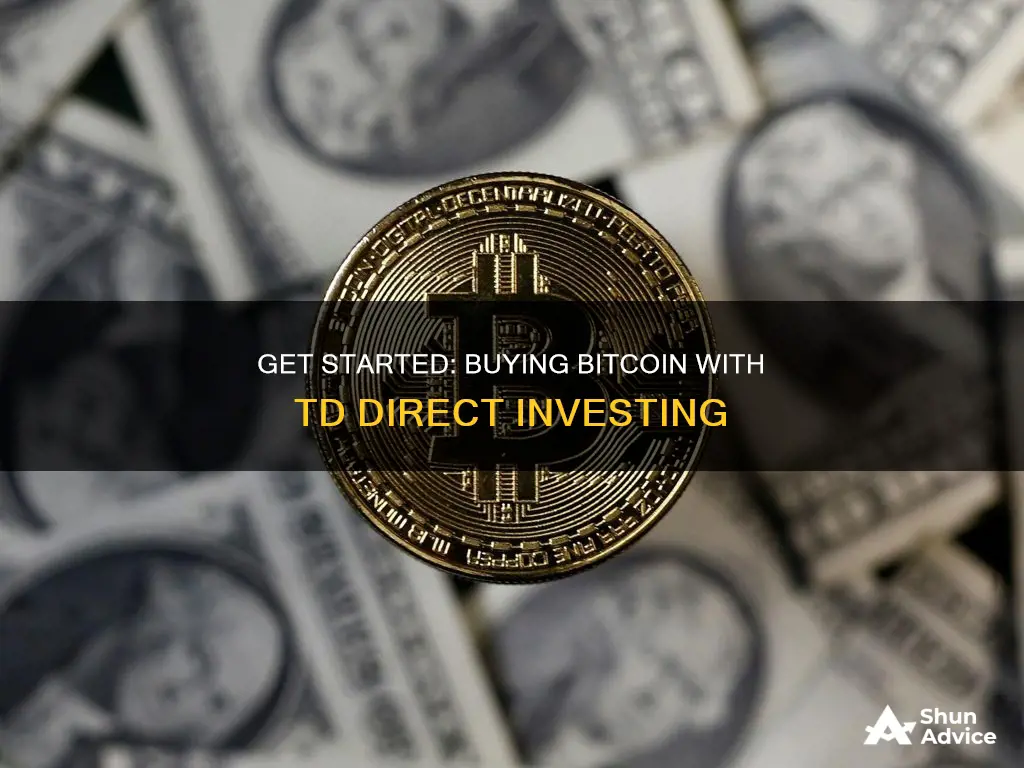
Cryptocurrencies are digital assets that are usually created using blockchain technology, which makes it possible to exchange them without the need for a central authority like a bank. Bitcoin was the first cryptocurrency to achieve prominence, and it remains the dominant force in the market. While some cryptocurrencies have been around for 12 years, there is still a lot of ambiguity and misinformation surrounding them.
If you're a TD Bank customer, you can buy Bitcoin and other cryptocurrencies through licensed Canadian cryptocurrency exchanges. Although the bank does not offer direct crypto trading services, it does allow users to transfer funds to platforms that adhere to Financial Transactions and Reports Analysis Centre (FINTRAC) regulations. One such platform is Kraken, which offers free CAD deposits and low trading fees.
Another option is to use a crypto ETF, which allows investors to gain exposure to the crypto market without the complexities of buying and holding individual cryptocurrencies. Crypto ETFs can be purchased with a TD Direct Investing account.
| Characteristics | Values |
|---|---|
| Crypto ETF availability | Yes |
| Crypto ETF types | Spot and Futures |
| Crypto ETF purchase options | Discount brokerage firm, Registered Retirement Savings Plan (RRSP), Tax-Free Savings Account (TFSA) |
| Crypto ETF benefits | Lower risk, no wallet storage, tax breaks, no need to trust a crypto exchange |
| Crypto ETF risks | Administration fees, potential lack of transparency, no actual ownership of crypto |
What You'll Learn

TD Direct Investing: Crypto ETFs
Crypto ETFs, or Cryptocurrency Exchange-Traded Funds, are investment funds that track the price of cryptocurrencies like Bitcoin, Ethereum (also known as Ether), Cardano, and Tether. Crypto ETFs are traded on stock exchanges and their price fluctuates daily based on the investments and sales on any given day. They are similar to traditional ETFs, which are traded like a stock on an exchange and provide instant diversification.
Crypto ETFs are a convenient way to invest in cryptocurrencies through a regular brokerage account without the complexities of direct crypto ownership or storage. They are available through most brokers who offer ETFs and can be purchased in registered accounts like Tax-Free Savings Accounts (TFSA) and Registered Retirement Savings Plans (RRSP) in Canada.
There are two main types of Crypto ETFs:
- Crypto Spot ETFs: These ETFs provide direct exposure to a specific cryptocurrency by holding the actual coin. They are ideal for investors who want to invest in crypto without the hassle of owning and storing the currency.
- Crypto Futures ETFs: These ETFs do not directly hold any cryptocurrency. Instead, they track cryptocurrency prices through futures contracts, which are based on speculation about the future price of the currency.
Crypto ETFs offer several benefits, including lower risk compared to direct crypto ownership (as there is no need for wallet storage), diversification across multiple cryptocurrencies, and the convenience of consolidating all holdings into one account. However, it's important to note that Crypto ETFs are still subject to the volatility of the crypto markets and may have higher management expense ratios than regular ETFs.
When considering investing in Crypto ETFs, it's crucial to understand the risks and benefits to ensure they align with your financial goals and risk profile.
Understanding Taxable Interest as Investment Value
You may want to see also

TD Direct Investing: Tax-Free Savings Account (TFSA)
A Tax-Free Savings Account (TFSA) is a registered savings account that allows Canadians over the age of 18 to grow and withdraw their money tax-free. This account is ideal for those saving for short- and long-term goals. With a self-directed TFSA from TD Direct Investing, you can choose your investments and take advantage of market opportunities in Canada and the US.
- Tax-free growth and withdrawals: You pay no tax on qualified investment income earned in your TFSA, and you can withdraw funds without paying tax.
- Variety of investment options: Your TFSA can hold various qualified investments, including cash, stocks, guaranteed investment certificates (GICs), mutual funds, bonds, and more.
- Carry forward contribution room: Any unused contribution room can be carried forward into future years, allowing you to accumulate and maximize your contribution room over time.
- No currency conversion costs: The TFSA has Canadian and US dollar components, so you can trade in either currency without incurring currency conversion fees.
- Flexibility: A TFSA offers flexibility in saving for short-term and long-term goals, and you can easily access your money depending on the type of investment you hold.
- No tax on withdrawals: You can withdraw your money at any time without incurring taxes. However, funds withdrawn may be subject to a prescribed withholding tax, affecting government benefits.
- Annual contribution limit: The contribution limit for 2024 is $7,000, and you can carry forward unused contribution room from previous years.
Please note that while TD Direct Investing offers a convenient platform for investing in Crypto ETFs, actual cryptocurrencies like Bitcoin cannot be purchased directly through this account.
The Crypto Investment Conundrum: Which Coin to Choose?
You may want to see also

TD Direct Investing: Registered Retirement Savings Plan (RRSP)
TD Direct Investing offers a self-directed Registered Retirement Savings Plan (RRSP) that allows you to expand your investment horizons while taking advantage of tax-deferred benefits. With a self-directed RRSP, you can build and manage your own investment portfolio, giving you greater control and a clearer picture of your entire retirement portfolio.
One of the key advantages of a TD Direct Investing RRSP is the ability to defer taxes while working towards your retirement goals. Contributions to your RRSP can reduce your taxable income, lowering the amount of tax you pay. Your investments can grow tax-deferred, and you are not taxed on withdrawals. This means your money can grow faster, helping you build a substantial retirement fund.
TD Direct Investing offers a range of investment options within your RRSP, including stocks, mutual funds, exchange-traded funds (ETFs), options, fixed income, and guaranteed investment certificates (GICs). You can trade across major markets in Canada and the U.S., including TSX, NASDAQ, and NYSE.
Additionally, TD Direct Investing provides easy account management. You can make contributions and withdrawals online, and they take care of the administration of your account, including registering your account and transferring funds from another financial institution.
To get started with a TD Direct Investing RRSP, you can open an account online or speak to a banking specialist at a branch convenient for you. They offer a fast and easy account opening process, and their specialists are ready to answer any questions you may have.
Bitcoin Investment: Is It Too Late to Invest?
You may want to see also

TD Direct Investing: Cash or Margin Account
TD Direct Investing offers a variety of accounts to help you get started with investing, including Cash and Margin accounts.
Cash Account
A Cash Account is a good option for those new to self-directed investing or experienced traders. It is easy to open and can be set up as an individual, joint, or business account. With a Cash Account, you can invest in Canadian and US markets with stocks, mutual funds, ETFs, options, and fixed income. You can also save on currency conversion costs by trading US dollar securities using the US dollar component of your account. Additionally, TD Direct Investing offers investment services such as Dividend Reinvestment Plans (DRIPs) and Systematic Investment Plans (SIPs) to help build your portfolio.
Margin Account
A Margin Account provides access to more advanced trading strategies and platforms, such as multi-leg option trades and short selling. With a Margin Account, you can borrow against the value of securities you already own to purchase additional investments, leveraging your portfolio. This account type also allows you to access competitive margin rates and trade in Canadian and US markets. Similar to a Home Equity Line of Credit (HELOC), a Margin Account lets you borrow funds to buy investments, with the investments serving as collateral. It is important to note that using margin to borrow is optional, and you can choose to pay for investments with your own money. Margin Accounts come with greater risk than Cash Accounts, as using borrowed money to finance securities purchases can result in greater losses.
A Beginner's Guide to Investing via Coinbase
You may want to see also

TD Direct Investing: Mutual Funds vs ETFs
When it comes to investing, there are many options to choose from, each with its own set of advantages and disadvantages. Two of the most popular investment products are Mutual Funds and Exchange-Traded Funds (ETFs). Understanding the differences between the two can help investors make informed decisions about which product better suits their financial goals and risk tolerance.
Mutual Funds
Mutual Funds are investment vehicles that pool money from multiple investors to purchase a diverse range of pre-selected securities, such as stocks, bonds, and other assets. The fund is managed by a professional fund manager who, along with a team of analysts, selects investments based on the fund's strategic focus. Mutual Funds offer instant diversification, allowing investors to spread their investments across multiple companies and sectors, reducing the risk of any single investment significantly impacting their portfolio.
One of the advantages of Mutual Funds is that they are professionally managed, relieving investors of the burden of constantly monitoring the markets. They are also suitable for those who want a more hands-off approach to investing, as they are often designed for long-term investors. Additionally, Mutual Funds can be easily incorporated into automatic contribution programs, making them a convenient option for those who want to invest regularly.
However, one of the drawbacks of Mutual Funds is the management fees associated with them, which can impact overall performance. These fees are typically higher than those of ETFs, as Mutual Funds usually carry operating expenses on top of management fees and sales taxes. Mutual Funds are also less flexible in terms of buying and selling, as they are traded only at the end of the trading day, based on market close prices.
ETFs
ETFs, like Mutual Funds, provide investors with a way to diversify their portfolios by pooling money into a fund that invests in a collection of stocks, bonds, or other assets. However, ETFs differ from Mutual Funds in that they are traded on stock exchanges and can be bought and sold at any time during the trading day, similar to individual stocks. This gives investors more control over their investments and makes ETFs well-suited for those who enjoy managing their own investments.
One of the advantages of ETFs is their lower fees compared to Mutual Funds. Many ETFs are passively managed, meaning they track a benchmark index rather than relying on a fund manager's outlook. As a result, their management expense ratios (MERs) tend to be lower. ETFs also tend to be more transparent, with issuers providing a full list of underlying holdings on their websites.
However, one potential drawback of ETFs is the trading commissions and costs associated with frequent trading, which can eat into returns. Additionally, ETFs may be more suitable for those who are comfortable with a higher level of risk, as their prices fluctuate throughout the day, and there may be a greater potential for loss.
Both Mutual Funds and ETFs can be effective tools for investors, depending on their financial goals and risk tolerance. Mutual Funds offer a more hands-off approach with professional management, while ETFs provide greater flexibility and control over investments. Mutual Funds may be more suitable for long-term investors, while ETFs can be a good option for those who want to actively manage their portfolios. Ultimately, the decision to invest in Mutual Funds, ETFs, or a combination of both depends on the individual's investment style and goals.
Dogecoin Investing: A Beginner's Guide to Getting Started
You may want to see also
Frequently asked questions
You can buy Bitcoin ETFs with a TD Direct Investing account. Crypto ETFs allow investors to gain exposure to the crypto market without the complexities of buying and holding individual crypto.
Crypto ETFs are a convenient way to invest in Bitcoin through your regular brokerage account, without the hassle of direct crypto ownership or storage. They can be traded with the same ease as buying and selling stocks. They are also eligible for TFSA and RRSP.
Even with no direct ownership of Bitcoin, Crypto ETFs are still subject to the volatility of the crypto markets. There is also a risk of tracking errors and potential lack of transparency or inaccurate reflection of actual crypto prices.







